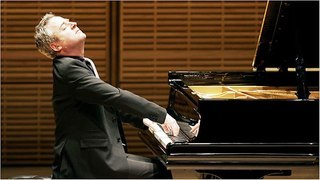|
Back
A Very Personal Cosmoology New York
92nd Street Y
12/09/2017 -
Wolfgang Amadeus Mozart: Rondo in A Minor, K. 511
Sergei Prokofiev: Visions Fugitives, Opus 22
Ludwig von Beethoven: Piano Sonata No. 30, Opus 109
Robert Schumann: Symphonic Etudes, Opus 13
Jeremy Denk (Pianist) 
J. Denk
Jeremy Denk began and ended his recital last night with Mozart. In between, he traveled through an endless cosmos of his own making.
Mind you, this program was quite radical for Mr. Denk. His usual choices have always included a selection from Webern, De Lassus, Johann Joseph Fux, Ives or a few organ transcriptions of Sweelinck. Last night, every name was recognized, and the music was almost mainstream. (Though I’d never heard Prokofiev’s lapidary Visions Fugitives in recital).
But not a soul in the full house at the 92St Y could have imagined how Mr. Denk’s authorized genius could have uncovered so much from under the familiar scores.
Before a note was offered, he gave a short introduction which, for the first time in history, could have been called A Genial Ontology. How Mozart, Prokofiev and Beethoven saw time as being limited, malleable. Whether this affected the music is questionable. But it certainly showed Mr. Denk’s respect for his audience.
For the second half, he inserted a set of virginal variations of William Byrd. And if Robert Schumann was ignorant of that composer, Mr. Denk assured us that there is an almost metaphysical cohesion between 1600 London and 1837 Leipzig.
Thus his words. (And thus a Requiem for Mr. Denk’s blog which, obviously due to work, has been discontinued.)
The music was another thing. Opening was the Mozart A Minor Rondo, a work with a complexity which belies its innocent name. Nor did Mr. Denk make it easy. Even ignoring the intricate counterpoint, the pianist made certain we were listening to a modern Steinway rather than Mozart’s simple instrument. He changed tone color and accents, he bounced off one key, made the other keys whisper, gave what seemed like an improvisational flair to the different themes of the rondo and allowed himself to build an interconnected structure.
Others might have tortured the Rondo into becoming Mozart’s future (for died before changing the whole history of music), but Mr. Denk kept it light, and kept the audience guessing on where he was going.
The Prokofiev Visions Fugitives could be compared perhaps to truncated Beethoven Bagatelles. Fleeting ideas that had the potential of development, but simply let themselves be put on staves. The Russian’s 20 pieces run the gamut from ridiculous to harp-like to solemn, to luscious to near bombastic.
But Prokofiev’s bombast has always its own luster, and Mr. Denk picked up on each mood change. Some, I know, are irritated that the pianist’s face reflects–literally–each emotion, each little picture as it comes about. But this is no affectation. He obviously does feel for each note. And if the Visions Fugitives were equally Mr. Denk’s fugitive visages, so be it. Live with it.
The Beethoven Sonata followed this for the first half, but we shall come to that later. The second half–with the Byrd “extra” and one encore of the most stride-piano jazzed-up Wagner Tannhäuser ever created (the theme itself has the squareness of a Congregationalist hymn tune) was devoted to the Etudes symphoniques.
Devoted is the right words. His notes on that first chord were placed so evenly and sensitively, the tone so rich, that I was initially afraid he might hold back. But no. Pianists can’t help playing this with bravura bravissimo, and Mr. Denk was not afraid to give emotional brunt to the most feverish passages. But his poetry (in, say the eleventh variation) was introspective, emotional, his fingering not always perfect in the most dazzling passages, but his emotion and energy went hand in hand.
The last 30 seconds are always the most fulfilling, and Mr. Denk did not fail. Changing from the minor to major key was simply changing from the Herculean challenges to the Napoleonic victory. And the audience rose as one to celebrate.
The Beethoven 30th Sonata was, to me, the apogee of the evening. The poetry and marathon race of the first two movements were both impressive enough. But Opus 109 was composed for a finale which is more than twice the length of these sections combined, with more than enough material for a dozen sonatas by lesser writers.
Initially, I thought of mentally taking notes, but immediately realized the abortive use of the mind. Thus, a total surrender to the music itself.
This was music on the grandest of scales, not the great-sounding versions played by pianists today, but the grand grandeur, the fullest sense of music played by those legends of time past. Without going into the details (which are obviously different), one felt that this was the Beethoven of Schnabel or Richter or Arrau. Yes, the movement is pure poetry. But poetry encompasses Homer and Dante as well as Keats and Byron.
The passages could indeed be thundering. But Beethoven always had the intention of bringing it back to that first theme. Mr. Denk’s performance embraced each of the variations. Yet at the end, one realized that each note had been writ to create the artist’s edifice of unbounded freedom, limitless breadth.
Harry Rolnick
|